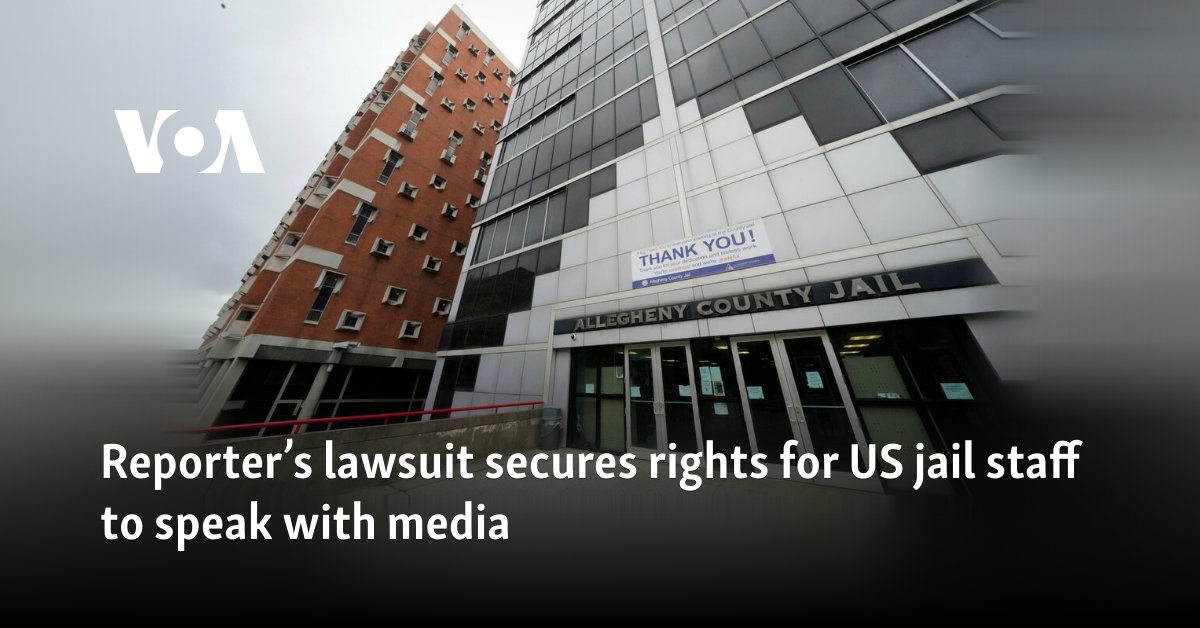
This article was originally published on VOA News - America. You can read the original article HERE

When Brittany Hailer reported that 21 inmates had died in three years at the Allegheny County Jail in Pittsburgh, Pennsylvania, her sources included the jail’s employees.
But those anonymous sources risked their jobs talking to Hailer because of an Allegheny County Bureau of Corrections policy that prevented employees from speaking to the press.
“It did make the reporting very hard,” said Hailer. “And I had to protect them because they could lose their job if I identified them in any way.”
To protect the employees and her ability to report about jail conditions, Hailer filed a federal lawsuit in August 2023. At the time, she was director of the Pittsburgh Institute for Nonprofit Journalism. She recently joined The Marshall Project, a nonprofit that reports on the U.S. criminal justice system.
Hailer sued the county over its 10-page policy that prevented employees from making statements on specific jail policies, facility operations or how events are handled without approval from the warden or a designee.
That policy, said Hailer, interfered with her work exposing the jail’s environment to the public, including poor conditions, insufficient medical care and COVID-19 precautions, and the “23 and 1” policy of locking inmates in their cells for 23 hours a day.
“I think what was super encouraging about the Allegheny County Jail is those folks were united,” Hailer told VOA. “The people working in the jail and the people living in the jail were on the same page. They both wanted conditions to improve.”
In April, a settlement was reached, allowing jail employees to give reporters information of public concern and acknowledging reporters’ rights to receive it.
“I think it is amazing,” said Charles Timbers, a nurse practitioner who worked at the jail for three years.
“Maybe through her efforts, things will change,” said Timbers, who was a source for the reporter. “But it is going to take a while for the employees to feel comfortable about coming forward, because for so long, they were stifled.”
The Reporters Committee for Freedom of the Press, or RCFP, and the Yale Law School Media Freedom and Information Access Clinic, which helped Hailer in the case, call the settlement unprecedented.
Paula Knudsen Burke, the RCFP attorney who represented Hailer, says the settlement underscores the First Amendment right for employees of all government agencies and institutions to speak freely.
“This is a special case not only for Brittany, but also for the employees of the Allegheny County Jail,” Burke said. “Because up to the point that the settlement was finalized, employees were scared. And we had evidence that employees had been disciplined and fired for speaking to the press.”
As part of the settlement, the jail agreed to revise four policies on ethics, access to the news media, use of social media and incident reporting procedures.
Hailer’s case is not isolated. Several government agencies have similar policies, says Caroline Hendrie, executive director of the Society of Professional Journalists, or SPJ.
SPJ started Gagged America, a website that details policies across government where employee speech is heavily restricted. So far it has found 25 policies, 12 of which ban employees from speaking with the press.
The agencies it features include the Department of Education, the Federal Aviation Administration, and the Federal Energy Regulatory Commission, as well as state, local and Indigenous governments.
“This is an under-recognized problem that is actually widespread,” Hendrie told VOA. “It really tramples workers’ rights and press freedom. We need to start pushing for access to people, not just documents.”
“If we don’t have access to the knowledgeable people, who understand the context for the data and for the documents, we are not necessarily getting the full story,” Hendrie added.
Allegheny County declined VOA’s interview requests. But in an email, the county’s solicitor stated, “The County’s information is that no Allegheny County Bureau of Corrections staff were ever disciplined for their speech under the old policies,” which would include discharge.
Brian Englert, an Allegheny County Jail employee and president of one of its workers’ unions, disputes that claim.
Englert told VOA that he and other jail employees were disciplined by the county for violating the gag policy. He added in a text that he was suspended for three days and that another employee was fired for using social media. Hailer’s lawsuit also argues that action was taken against several employees.
Hailer says that in addition to securing the rights of journalists and government workers, the lawsuit will ensure the public knows what can happen in a U.S. jail.
“It was me knocking down different doors just to shed light,” Hailer told VOA.
This article was originally published by VOA News - America. We only curate news from sources that align with the core values of our intended conservative audience. If you like the news you read here we encourage you to utilize the original sources for even more great news and opinions you can trust!










Comments